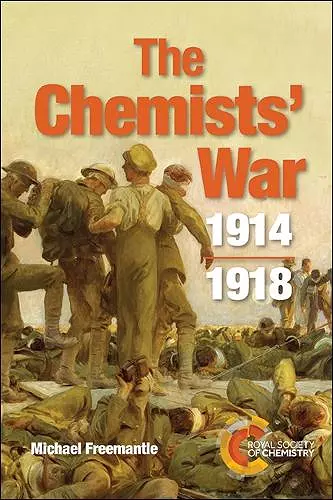Chemists' War
1914-1918
Format:Paperback
Publisher:Royal Society of Chemistry
Published:1st Sep '14
Should be back in stock very soon

Within months of the start of the First World War, Germany began to run out of the raw materials it needed to make explosives. As Germany faced imminent defeat, chemists such as Fritz Haber and Carl Bosch came to the rescue with Nobel Prize winning discoveries that overcame the shortages and enabled the country to continue in the war. Similarly, Britain could not have sustained its war effort for four years had it not been for chemists like Chaim Weizmann who was later to become the first president of the State of Israel.
Michael Freemantle tells the stories of these and many other chemists and explains how their work underpinned and shaped what became known as The Chemists’ War. He reveals:
• how chemistry contributed to the care of the sick and wounded and to the health and safety of troops;
• how coal not only powered the war but was also an important source of the chemicals needed for the manufacture of explosives, dyes, medicines and antiseptics;
• how Britain’s production of propellants relied on the slaughter of tens of thousands of whales;
• how a precious metal played a critical role in the war;
• how poisonous chemicals were used as weapons of mass destruction for the first time in the history of warfare and how chemists developed gas masks for protection against these weapons;
• how the British naval blockade of Germany imperilled agricultural production in the United States.
The book will appeal to the general reader as well as the many scientists and historians interested in the Great War.
This is an interesting book offering a different view from the large number that have been written on the politics and strategies of the war. It is well written, extensively referenced and includes a useful last chapter on the top 50 chemicals of the Great War. There is a lot of interesting chemistry but the human story is also strong.
"this is a highly professional account"
"he explains - in approachable, layman's terms - the basic ingredients of wartime gas chemistry"
"the book's most original contribution lies in drawing attention to the "metals of war", such as nickel, tin, tungsten, chromium, manganese, and zinc"
"such metals took a "starring role" on the battlefield"
"well worth including in any working library"
"Like its predecessor, The Chemists’ War is a good introduction to the subject in its widest dimensions."
* Bulletin for the History of Chemistry *"...a remarkably diverse collection of essays..."
"The book will appeal to the general reader as well as the many scientists and historians interested in the Great War"
* Popular ScienISBN: 9781849739894
Dimensions: unknown
Weight: 557g
358 pages